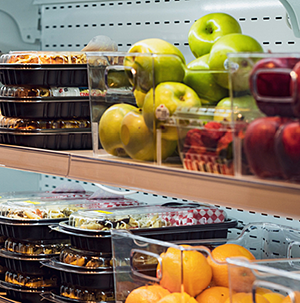Mixed residential and commerce sites are one of the hottest commodities in real estate these days, and Street Corner has seized the opportunity to downsize its convenience concept into smaller footprints in these kinds of buildings. “The Express model caters to urban development multiuse buildings and locations on college campuses,” said Vikram Dhillon, CEO of Street Corner, which has 40 franchisee-owned locations in 19 states. “Those stores have a heavier focus on fresh grab-and-go food, local products and organic items as well as our own 100% organic coffee brand.”
While Street Corner has been around since the late 1980s, the store has been branching out both into smaller and larger footprints. “We started as a convenience chain with locations mostly in airports and shopping malls—that’s what we were known as,” he said. “But seven years ago, we debuted our Urban Market concept as an upscale c-store and a few years later added the Express model as well.”
THE DIVERSIFICATION
For Street Corner, the key to its continued success has been to develop specific concepts to fit several location spaces. The company currently has three different convenience stores— Street Corner with full-service gas stations and drive-thrus (3,000 to 5,000 square feet); Urban Market, similar to Street Corner but without fuel (3,000 to 5,000 square feet); and Street Corner Express, no fuel and in office buildings or multiuse residential buildings (800 to 1,200 square feet).
“Our background is tight spaces, with our first stores in shopping malls,” Dhillon said of the newer Express concept. “So, we know how to maximize the footprint to provide what the customers want in a smaller setting.”
For example, Express stores revolve around organic coffee and fresh food in grab-and-go coolers, beer and wine, snacks and health and beauty. There’s no space for kitchens, so a vendor supplies the fresh packaged sandwiches, yogurt parfaits, salads, fruit, wraps and meal prep kits. “We have 50% of products from major brands, with the other 50% local and healthy products,” Dhillon said. “Our goal is definitely to promote a healthy lifestyle.” To that end, tobacco products are featured less in all stores but especially the Express ones.
Currently, there are two Express models open, with one in a San Diego office complex and the other in a mixed residential building in Corona, California. “These stores also have the capability for self-checkout and for ordering via an app, too,” he said. The company would like to open more Express models on college campuses, in hospitals and at airports.
The availability of these smaller retail spaces has been fueled by the expansion of mixed-use development across the country. “Landlords of these developments want different businesses, and with the Express model, we can provide both a unique concept to the retail mix and a needed service to the complex residents,” he said.
THE VIBE
All of Street Corner’s concepts have an upscale vibe. “We focus heavily on music as well, and all of our new stores have a good sound system,” Dhillon said. “We want customers walking in to have this cool vibe, to feel positive and want to grab something healthy.”
The stores have a contemporary design with sleek, straight lines. “The green logo expresses the urban feel,” he said. “We have a lot of green inside our stores, along with murals designed to fit the local demographics.”
In keeping with that aesthetic, the company encourages franchisees to create their own local promotions on social media. “As a company, we have a Facebook and Instagram presence, but we don’t do any national campaigns,” he said. Instead, each store usually runs local social media campaigns, which Dhillon said has proved to be more effective.
Overall, everything Street Corner does with its concepts is geared toward changing the image customers have of convenience stores. “Not every c-store is the same,” he said. “We want our customers to have a very positive experience when they visit our stores and think this is the way every convenience store should be.”
Bright Ideas


With a small store, it's even more important to maximize shelf space while still creating an inviting environment for shoppers. With its Express models, Street Corner "didn't want to clutter the store with a lot of displays but rather focus on the heavy hitters to earn the best dollar per square foot," said Vikram Dhillon, CEO of Street Corner. To do that, the company only brings in the top sellers in the most popular categories, as well as eliminates categories that don't make sense for the urban location.
"For example, Express stores don't have automotive sections because most people living in the mixed use buildings don't have cars or don't drive their vehicles very often," he explained. Express stores also have more fresh food in open-air cases for grab-and-go options. "We work closely with vendors to determine what's selling in the local area so we're sure to stock those items, as well as the national best-sellers," he said.
See More!
 Ideas 2 Go showcases how retailers today are operating the convenience store of tomorrow. To see videos of the c-stores we profiled in 2022 and earlier, go to www.convenience.org/ideas2go.
Ideas 2 Go showcases how retailers today are operating the convenience store of tomorrow. To see videos of the c-stores we profiled in 2022 and earlier, go to www.convenience.org/ideas2go.